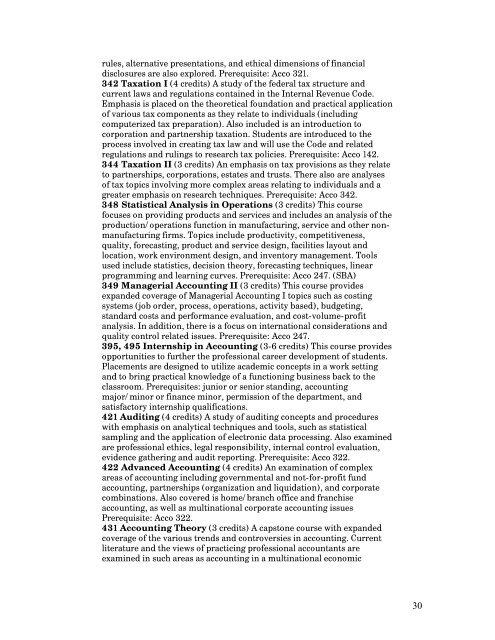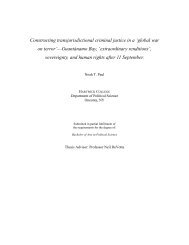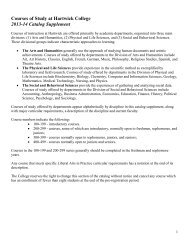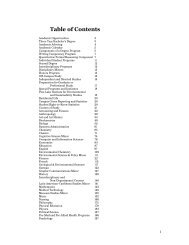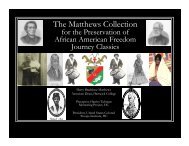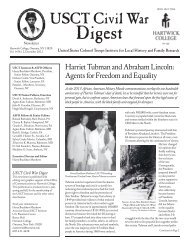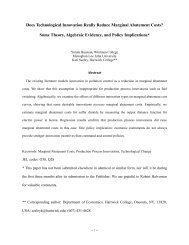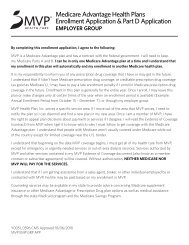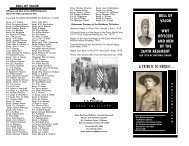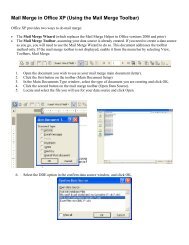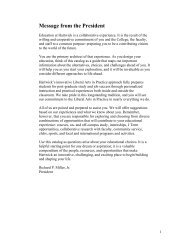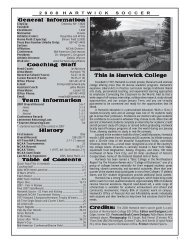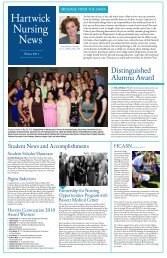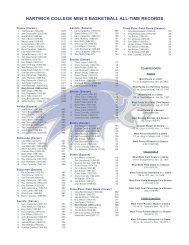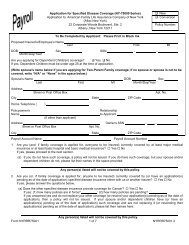Table of Contents - Hartwick College
Table of Contents - Hartwick College
Table of Contents - Hartwick College
Create successful ePaper yourself
Turn your PDF publications into a flip-book with our unique Google optimized e-Paper software.
ules, alternative presentations, and ethical dimensions <strong>of</strong> financial<br />
disclosures are also explored. Prerequisite: Acco 321.<br />
342 Taxation I (4 credits) A study <strong>of</strong> the federal tax structure and<br />
current laws and regulations contained in the Internal Revenue Code.<br />
Emphasis is placed on the theoretical foundation and practical application<br />
<strong>of</strong> various tax components as they relate to individuals (including<br />
computerized tax preparation). Also included is an introduction to<br />
corporation and partnership taxation. Students are introduced to the<br />
process involved in creating tax law and will use the Code and related<br />
regulations and rulings to research tax policies. Prerequisite: Acco 142.<br />
344 Taxation II (3 credits) An emphasis on tax provisions as they relate<br />
to partnerships, corporations, estates and trusts. There also are analyses<br />
<strong>of</strong> tax topics involving more complex areas relating to individuals and a<br />
greater emphasis on research techniques. Prerequisite: Acco 342.<br />
348 Statistical Analysis in Operations (3 credits) This course<br />
focuses on providing products and services and includes an analysis <strong>of</strong> the<br />
production/operations function in manufacturing, service and other nonmanufacturing<br />
firms. Topics include productivity, competitiveness,<br />
quality, forecasting, product and service design, facilities layout and<br />
location, work environment design, and inventory management. Tools<br />
used include statistics, decision theory, forecasting techniques, linear<br />
programming and learning curves. Prerequisite: Acco 247. (SBA)<br />
349 Managerial Accounting II (3 credits) This course provides<br />
expanded coverage <strong>of</strong> Managerial Accounting I topics such as costing<br />
systems (job order, process, operations, activity based), budgeting,<br />
standard costs and performance evaluation, and cost-volume-pr<strong>of</strong>it<br />
analysis. In addition, there is a focus on international considerations and<br />
quality control related issues. Prerequisite: Acco 247.<br />
395, 495 Internship in Accounting (3-6 credits) This course provides<br />
opportunities to further the pr<strong>of</strong>essional career development <strong>of</strong> students.<br />
Placements are designed to utilize academic concepts in a work setting<br />
and to bring practical knowledge <strong>of</strong> a functioning business back to the<br />
classroom. Prerequisites: junior or senior standing, accounting<br />
major/minor or finance minor, permission <strong>of</strong> the department, and<br />
satisfactory internship qualifications.<br />
421 Auditing (4 credits) A study <strong>of</strong> auditing concepts and procedures<br />
with emphasis on analytical techniques and tools, such as statistical<br />
sampling and the application <strong>of</strong> electronic data processing. Also examined<br />
are pr<strong>of</strong>essional ethics, legal responsibility, internal control evaluation,<br />
evidence gathering and audit reporting. Prerequisite: Acco 322.<br />
422 Advanced Accounting (4 credits) An examination <strong>of</strong> complex<br />
areas <strong>of</strong> accounting including governmental and not-for-pr<strong>of</strong>it fund<br />
accounting, partnerships (organization and liquidation), and corporate<br />
combinations. Also covered is home/branch <strong>of</strong>fice and franchise<br />
accounting, as well as multinational corporate accounting issues<br />
Prerequisite: Acco 322.<br />
431 Accounting Theory (3 credits) A capstone course with expanded<br />
coverage <strong>of</strong> the various trends and controversies in accounting. Current<br />
literature and the views <strong>of</strong> practicing pr<strong>of</strong>essional accountants are<br />
examined in such areas as accounting in a multinational economic<br />
30


